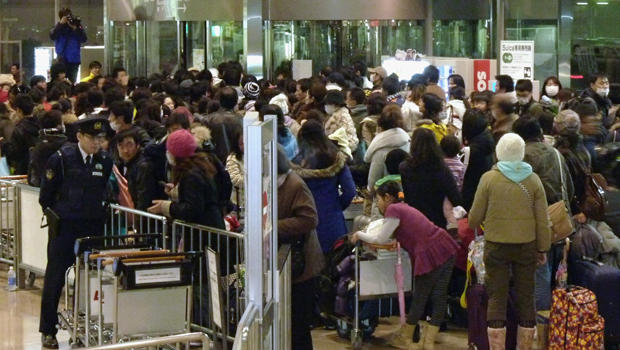Nations' advice to citizens differs on Japan
A growing number of foreign governments and businesses are telling their people to leave certain areas of Japan, urging stronger safety precautions than what the country is recommending to their own citizens.
On Wednesday, the White House recommended that U.S. citizens stay 50 miles away from the Fukushima Dai-ichi nuclear plant, not the 20-mile radius recommended by the Japanese.
Chip Reid: Why did the U.S. break from Japan's 20-mile recommendation?
White House spokesman Jay Carney said the move didn't signal a lack of confidence in Japan, but that the Nuclear Regulatory Commission was using its own data and making a recommendation based on how it would handle the incident if it happened in the United States. Carney said the White House consulted with the Japanese government before making the recommendation.
Complete coverage: Disaster in Japan
Weather hampers U.S. relief flights over Japan
Expert: Japan botching nuke crisis management
Also on Wednesday, Australia and Germany advised their citizens in Japan on to consider leaving Tokyo and earthquake-affected areas.
The Department of Foreign Affairs and Trade, however, said its advice to Australians had nothing to do with the threat of nuclear contamination from the damaged plant.
"We are providing this advice because of the continuing disruption to major infrastructure, its impact on the welfare of people on the ground and continuing aftershocks," its notice said.
Tokyo, which is about 170 miles from the stricken nuclear complex, reported slightly elevated radiation levels Tuesday. Officials said the increase was too small to threaten the 39 million people in and around the capital, but some countries have relocated their embassies or suggested their citizens leave the area.
Germany's Foreign Ministry advised its citizens living near the nuclear plant or in the capital region to either leave the country or move to the Osaka area west of Tokyo.
Ministry spokesman Andreas Peschke said an estimated 5,000 Germans were in Japan before the earthquake, but now only about 1,000 are believed to remain in and around the capital. Germany's embassy in Tokyo also has been "partly relocated" to the consulate general in Osaka, Peschke said.
Japan hikes nuke workers' legal radiation dose
Stocks fall on weak economic reports, Japan crisis
American thought found in Japan still missing
France has urged its citizens with no reason to stay in Tokyo return to France or head to southern Japan. The government has asked Air France to mobilize aircraft in Asia to assist with departures.
Serbia and Croatia advised their citizens to leave Japan, while Croatia said it was moving its embassy from Tokyo to Osaka because of the nuclear crisis.
More than 3,000 Chinese have already been evacuated from Japan's northeast to Niigata on Japan's western coast, according to Xinhua News Agency. On Tuesday, Beijing became the first government to organize a mass evacuation of its citizens from the quake-affected area.
Pictures: U.S. relief crews in Japan
Pictures: Japan's nuclear crisis
Radiation reality check: Risks and fears
Other governments, including the U.K., are taking a more measured approach.
The U.K Foreign & Commonwealth Office advises against all nonessential travel to Tokyo and northeastern Japan. It urges British citizens in the country to observe Japanese authorities' advice, including the 12.4-mile exclusion zone around the Fukushima nuclear plant.
It said it is actively monitoring the situation.
The Philippine Embassy in Tokyo told its citizens to follow advisories issued by Japanese authorities. It added, however, that Filipinos who are concerned about possible radiation exposure "may wish to voluntary relocate to areas further away, or depart voluntarily from the country using their own means."
If relocation and repatriation become necessary, the Philippine government will defray the costs involved, the Department of Foreign Affairs said in a statement.
An Indian software services company, L&T Infotech, on Wednesday ordered the temporary evacuation of 185 employees and their family members from Japan. It said in a release that it had chartered a special Kingfisher Airlines flight that will depart Friday to Chennai, India.
Cirque du Soleil has also decided to move its performers and staff working in Japan to Macau, said spokeswoman Chantal Cote in an e-mail. Its show "ZED" is based at Tokyo Disneyland, the touring "KOOZA" show was performing at the Fuji Dome in Tokyo.

